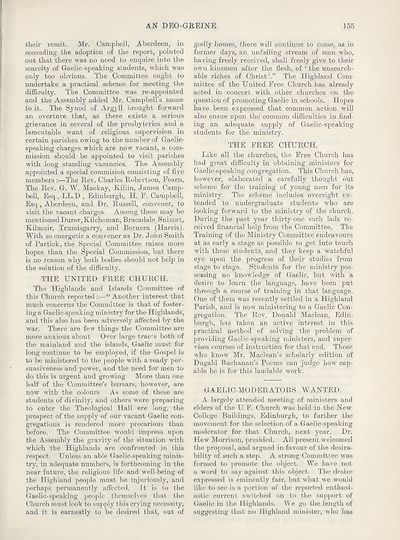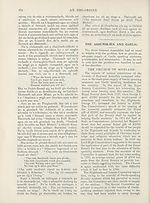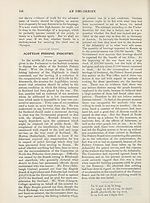An Comunn Gàidhealach Publications > Deo-gréine > Volume 10, October 1914-September 1915
(163) Page 155
Download files
Complete book:
Individual page:
Thumbnail gallery: Grid view | List view

AN DEO-GREINE.
155
their remit. Mr. Campbell, Aberdeen, in
seconding the adoption of the report, pointed
out that there was no need to enquire into the
scarcity of Gaelic-speaking students, which was
only too obvious. The Committee ought to
undertake a practical scheme for meeting the
difficulty. The Committee was re-appointed
and the Assembly added Mr. Campbell’s name
to it. The Synod of Argyll brought forw'ard
an overture that, as there exists a serious
grievance in several of the presbyteries and a
lamentable want of religious supervision in
certain parishes owing to the number of Gaelic¬
speaking charges which are now vacant, a com¬
mission should be appointed to visit parishes
with long standing vacancies. The Assembly
appointed a special commision consisting of five
members :—The Rev. Charles Robertson, Fearn,
The Rev. G. W. Mackay, Killin, James Camp¬
bell, Esq., LL.D , Edinburgh, H. F. Campbell,
Esq, Aberdeen, and Dr. Russell, convener, to
visit the vacant charges. Among these may be
mentioned Duror,Kilchoman, Bracadale_ Snizort,
Kilmuir, Trumisgarry, and Bernera (Harris).
With so energetic a convener as Dr. John Smith
of Particle, the Special Committee raises more
hopes than the Special Commission, but there
is no reason why both bodies should not help in
the solution of the difficulty.
THE UNITED FREE CHURCH.
The Highlands and Islands Committee of
this Church reported:— “ Another interest that
much concerns the Committee is that of foster¬
ing a Gaelic-speaking ministry for the Highlands,
and this also has been adversely affected by the
war. There are few things the Committee are
more anxious about Over large tracs both of
the mainland and the islands, Gaelic must for
long continue to be employed, if the Gospel is
to be ministered to the people with a ready per¬
suasiveness and power, and the need for men to
do this is urgent and growing More than one
half of the Committee’s bursars, however, are
now with the colours As some of these are
students of divinity, and others were preparing
to enter the Theological Hall ere long, the
prospect of the supply of our vacant Gaelic con¬
gregations is rendered more precarious than
before. The Committee would impress upon
the Assembly the gravity of the situation with
which the Highlands are confronted in this
respect. Unless an able Gaelic-speaking minis¬
try, in adequate numbers, is forthcoming in the
near future, the religious life and well-being of
the Highland people must be injuriously, and
perhaps permanently affected. It is to the
Gaelic-speaking people themselves that the
Church must look to supply this crying necessity,
and it is earnestly to be desired that, out of
godly homes, there will continue to come, as in
former days, an unfailing stream of men who,
having freely received, shall freely give to their
own kinsmen after the flesh, of ‘ the unsearch¬
able riches of Christ’.” The Highland Com¬
mittee of the United Free Church has already
acted in concert with other churches on the
question of promoting Gaelic in schools. Hopes
have been expressed that common action will
also ensue upon the common difficulties in find¬
ing an adequate supply of Gaelic-speaking
students for the ministry.
THE FREE CHURCH.
Like all the churches, the Free Church has
had great difficulty in obtaining ministers for
Gaelic-speaking congregation. This Church has,
however, elaborated a carefully thought out
scheme for the training of young men for its
ministry. The scheme includes oversight ex¬
tended to undergraduate students who are
looking forward to the ministry of the church.
During the past year thirty-One such lads re¬
ceived financial help from the Committee. The
Training of the Ministry Committee endeavours
at as early a stage as possible to get into touch
with these students, and they keep a watchful
eye upon the progress of their studies from
stage to stage. Students for the ministry pos¬
sessing no knowledge of Gaelic, but with a
desire to learn the language, have been put
through a course of training in that language.
One of them was recently settled in a Highland
Parish, and is now ministering to a Gaelic Con¬
gregation. The Rev. Donald Maclean, Edin¬
burgh, has taken an active interest in this
practical method of solving the problem of
providing Gaelic-speaking ministers, and super¬
vises courses of instruction for that end. Those
who know Mr. Maclean’s scholarly edition of
Dugald Buchanan’s Poems can judge how cap¬
able he is for this laudable work.
GAELIC-MODERATORS WANTED.
A largely attended meeting of ministers and
elders of the U.F. Church was held in the New
College Buildings, Edinburgh, to further the
movement for the selection of a Gaelic-speaking
moderator for that Church, next year. Dr.
Hew Morrison, presided. All present welcomed
the proposal, and argued in favour of the desira¬
bility of such a step. A strong Committee was
formed to promote the object. We have not
a word to say against this object. The desire
expressed is eminently fair, but what we would
like to see is a portion of the reported enthusi¬
astic current switched on to the support of
Gaelic in the Highlands. We go the length of
suggesting that no Highland minister, who has
155
their remit. Mr. Campbell, Aberdeen, in
seconding the adoption of the report, pointed
out that there was no need to enquire into the
scarcity of Gaelic-speaking students, which was
only too obvious. The Committee ought to
undertake a practical scheme for meeting the
difficulty. The Committee was re-appointed
and the Assembly added Mr. Campbell’s name
to it. The Synod of Argyll brought forw'ard
an overture that, as there exists a serious
grievance in several of the presbyteries and a
lamentable want of religious supervision in
certain parishes owing to the number of Gaelic¬
speaking charges which are now vacant, a com¬
mission should be appointed to visit parishes
with long standing vacancies. The Assembly
appointed a special commision consisting of five
members :—The Rev. Charles Robertson, Fearn,
The Rev. G. W. Mackay, Killin, James Camp¬
bell, Esq., LL.D , Edinburgh, H. F. Campbell,
Esq, Aberdeen, and Dr. Russell, convener, to
visit the vacant charges. Among these may be
mentioned Duror,Kilchoman, Bracadale_ Snizort,
Kilmuir, Trumisgarry, and Bernera (Harris).
With so energetic a convener as Dr. John Smith
of Particle, the Special Committee raises more
hopes than the Special Commission, but there
is no reason why both bodies should not help in
the solution of the difficulty.
THE UNITED FREE CHURCH.
The Highlands and Islands Committee of
this Church reported:— “ Another interest that
much concerns the Committee is that of foster¬
ing a Gaelic-speaking ministry for the Highlands,
and this also has been adversely affected by the
war. There are few things the Committee are
more anxious about Over large tracs both of
the mainland and the islands, Gaelic must for
long continue to be employed, if the Gospel is
to be ministered to the people with a ready per¬
suasiveness and power, and the need for men to
do this is urgent and growing More than one
half of the Committee’s bursars, however, are
now with the colours As some of these are
students of divinity, and others were preparing
to enter the Theological Hall ere long, the
prospect of the supply of our vacant Gaelic con¬
gregations is rendered more precarious than
before. The Committee would impress upon
the Assembly the gravity of the situation with
which the Highlands are confronted in this
respect. Unless an able Gaelic-speaking minis¬
try, in adequate numbers, is forthcoming in the
near future, the religious life and well-being of
the Highland people must be injuriously, and
perhaps permanently affected. It is to the
Gaelic-speaking people themselves that the
Church must look to supply this crying necessity,
and it is earnestly to be desired that, out of
godly homes, there will continue to come, as in
former days, an unfailing stream of men who,
having freely received, shall freely give to their
own kinsmen after the flesh, of ‘ the unsearch¬
able riches of Christ’.” The Highland Com¬
mittee of the United Free Church has already
acted in concert with other churches on the
question of promoting Gaelic in schools. Hopes
have been expressed that common action will
also ensue upon the common difficulties in find¬
ing an adequate supply of Gaelic-speaking
students for the ministry.
THE FREE CHURCH.
Like all the churches, the Free Church has
had great difficulty in obtaining ministers for
Gaelic-speaking congregation. This Church has,
however, elaborated a carefully thought out
scheme for the training of young men for its
ministry. The scheme includes oversight ex¬
tended to undergraduate students who are
looking forward to the ministry of the church.
During the past year thirty-One such lads re¬
ceived financial help from the Committee. The
Training of the Ministry Committee endeavours
at as early a stage as possible to get into touch
with these students, and they keep a watchful
eye upon the progress of their studies from
stage to stage. Students for the ministry pos¬
sessing no knowledge of Gaelic, but with a
desire to learn the language, have been put
through a course of training in that language.
One of them was recently settled in a Highland
Parish, and is now ministering to a Gaelic Con¬
gregation. The Rev. Donald Maclean, Edin¬
burgh, has taken an active interest in this
practical method of solving the problem of
providing Gaelic-speaking ministers, and super¬
vises courses of instruction for that end. Those
who know Mr. Maclean’s scholarly edition of
Dugald Buchanan’s Poems can judge how cap¬
able he is for this laudable work.
GAELIC-MODERATORS WANTED.
A largely attended meeting of ministers and
elders of the U.F. Church was held in the New
College Buildings, Edinburgh, to further the
movement for the selection of a Gaelic-speaking
moderator for that Church, next year. Dr.
Hew Morrison, presided. All present welcomed
the proposal, and argued in favour of the desira¬
bility of such a step. A strong Committee was
formed to promote the object. We have not
a word to say against this object. The desire
expressed is eminently fair, but what we would
like to see is a portion of the reported enthusi¬
astic current switched on to the support of
Gaelic in the Highlands. We go the length of
suggesting that no Highland minister, who has
Set display mode to:
![]() Universal Viewer |
Universal Viewer | ![]() Mirador |
Large image | Transcription
Mirador |
Large image | Transcription
| An Comunn Gàidhealach > An Comunn Gàidhealach Publications > Deo-gréine > Volume 10, October 1914-September 1915 > (163) Page 155 |
|---|
| Permanent URL | https://digital.nls.uk/125241420 |
|---|
| Description | Leabhar 10, Mìos Deireannach an Fhogharaidh 1914 gu Darna Mìos an Fhogharaidh 1915 |
|---|---|
| Attribution and copyright: |
|
| Description | This contains items published by An Comunn, which are not specifically Mòd-related. It includes journals, annual reports and corporate documents, policy statements, educational resources and published plays and literature. It is arranged alphabetically by title. |
|---|
| Description | A collection of over 400 items published by An Comunn Gàidhealach, the organisation which promotes Gaelic language and culture and organises the Royal National Mòd. Dating from 1891 up to the present day, the collection includes journals and newspapers, annual reports, educational materials, national Mòd programmes, published Mòd literature and music. |
|---|---|
| Additional NLS resources: |
|

